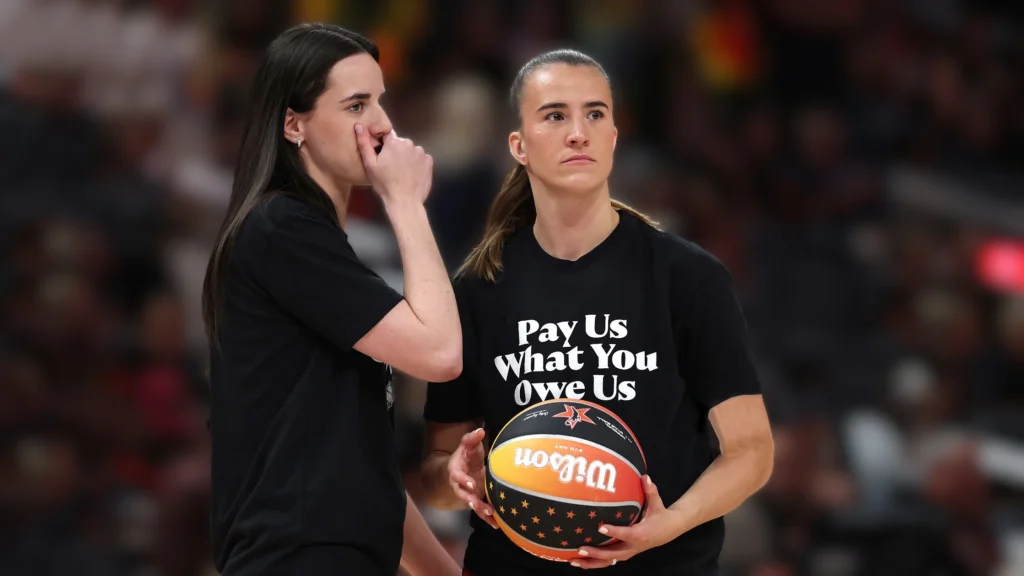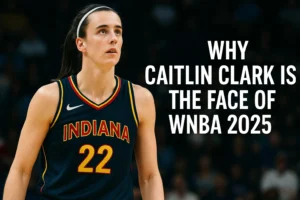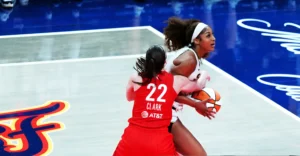
“Pay Us What You Owe Us” – The WNBA’s Loudest Roar Yet
“Pay Us What You Owe Us” isn’t just a catchy slogan—it’s the bold new anthem of the WNBA. This rallying cry emerged powerfully during the 2025 WNBA All-Star Game, as stars like Caitlin Clark and Napheesa Collier wore the message on black T-shirts. But this campaign is much more than symbolic attire; it’s a direct and urgent call for systemic reform in how WNBA players are valued, treated, and compensated.
The campaign shines a spotlight on persistent issues that have long plagued women’s professional basketball: pay inequity, insufficient benefits, limited resources, and inadequate working conditions. With the league enjoying historic growth in viewership, media coverage, and corporate sponsorships, players are demanding that their value—central to this growth—be recognized in real, tangible ways.
A Movement Born from Frustration and Growth
As the WNBA continues to rise in prominence, the gap between the players’ contributions and their compensation has become glaring. “Pay Us What You Owe Us” speaks to years of accumulated frustration. While players have always carried the league, they’re still battling for basic professional standards—equity in pay, fair revenue sharing, better facilities, and travel arrangements befitting elite athletes.
This is not a whisper for change. It’s a roar. The campaign’s deliberate spotlight during the All-Star weekend ensured maximum media attention and public visibility. It forced fans, journalists, and league executives alike to confront the uncomfortable truth: the athletes building this league are not being rewarded proportionately.
What the Campaign Demands
At its heart, the movement is about fair compensation. That means a restructured salary system, more equitable distribution of the league’s growing revenue, and enhanced retirement and healthcare benefits. These are not luxuries—they are expectations in any top-tier professional sports league.
Players also want better day-to-day conditions: reliable charter flights instead of exhausting commercial schedules, access to high-end medical staff and facilities, and year-round professional resources. Many athletes have shared stories of logistical nightmares and under-resourced environments that take a toll on both physical performance and mental well-being.
Unity, Visibility, and Strategy
Choosing the All-Star Game to amplify this message wasn’t accidental. It was a strategic moment—one where all eyes were already on the league’s top talents. By debuting the campaign on one of the biggest stages in women’s basketball, players ensured their voices couldn’t be ignored.
The unified message also signals strength in numbers. Across teams and backgrounds, players are standing together in pursuit of a better league—not just for themselves, but for future generations of WNBA talent. This solidarity is vital as the league and players prepare for upcoming collective bargaining discussions.
The League’s Crossroads
The WNBA is at a pivotal moment. With its growing popularity and expanding fan base, the league has an opportunity to redefine what professional women’s sports can look like. But that vision is incomplete without investing in the athletes who drive the product.
“Pay Us What You Owe Us” is a demand for structural change, yes—but it’s also a challenge to the league’s leadership: Are they willing to match the players’ commitment with real investment?
More Than a Moment—A Movement
This campaign has already sparked critical conversations beyond basketball. It’s part of a broader push for gender equity in sports and labor. It echoes the demands of women athletes across disciplines who are standing up for their rights—not just to play, but to thrive in their careers.
Ultimately, the campaign is about respect. It’s about recognizing the players’ role in elevating the WNBA and ensuring that role is honored through action, not just applause.
The league must now respond, not with vague promises or one-time bonuses, but with a comprehensive shift in how it treats its most valuable asset: the players. The message is clear, and the players are united.
“Pay Us What You Owe Us” isn’t a fleeting hashtag. It’s a movement—one with the power to reshape the WNBA’s future. The question that remains is whether the league will rise to the occasion or risk falling behind the players who’ve already taken the lead.

